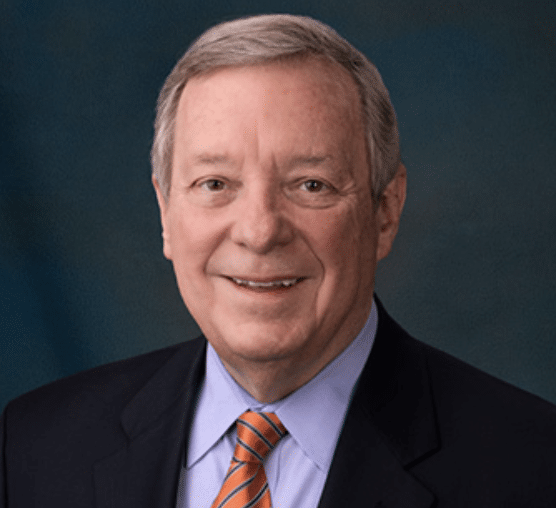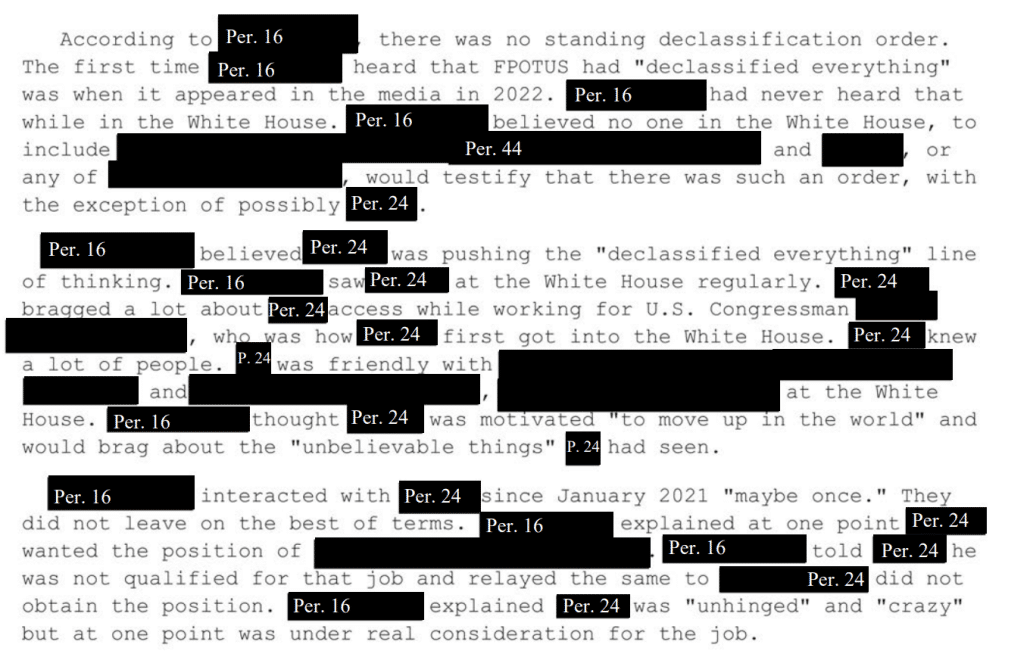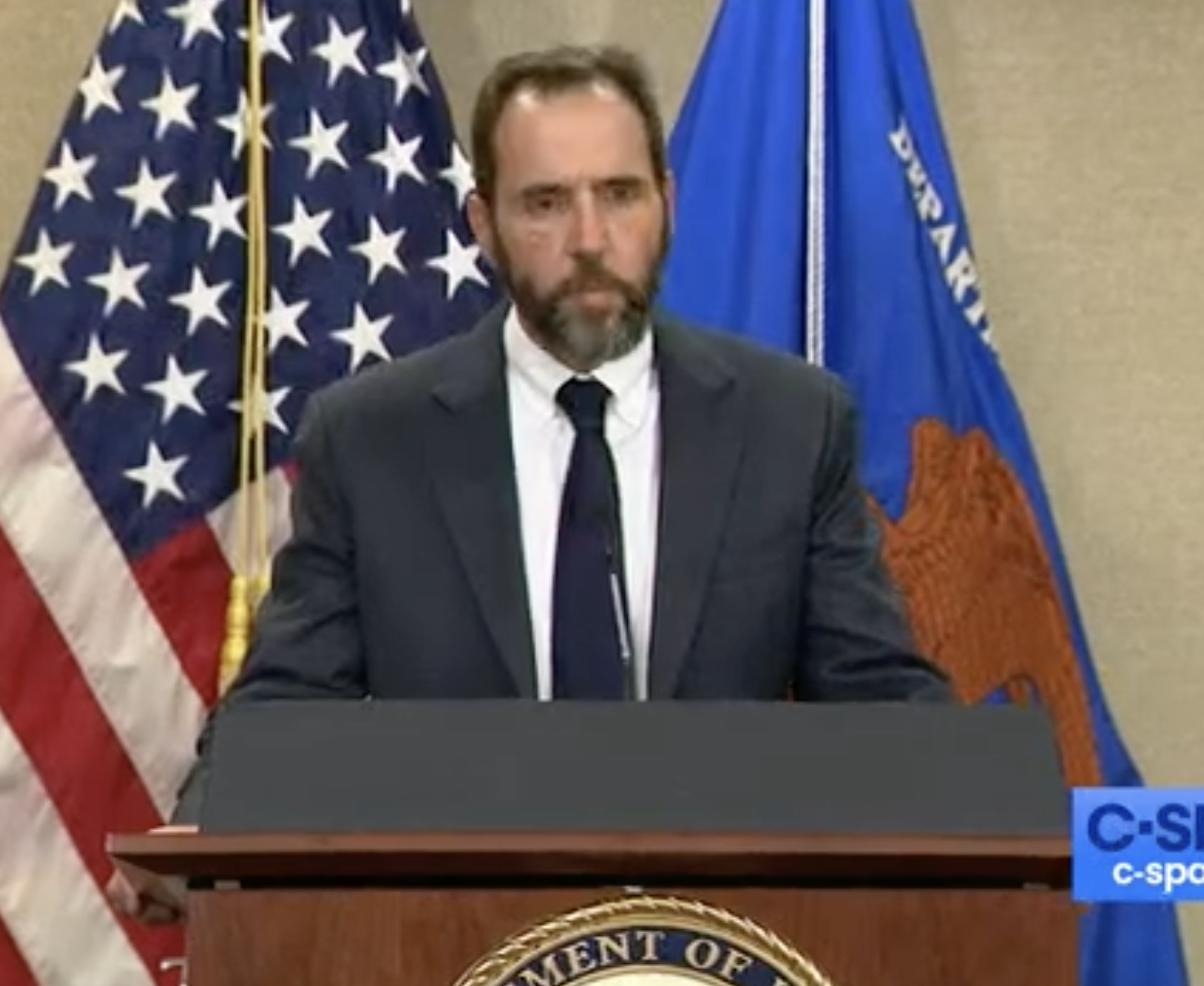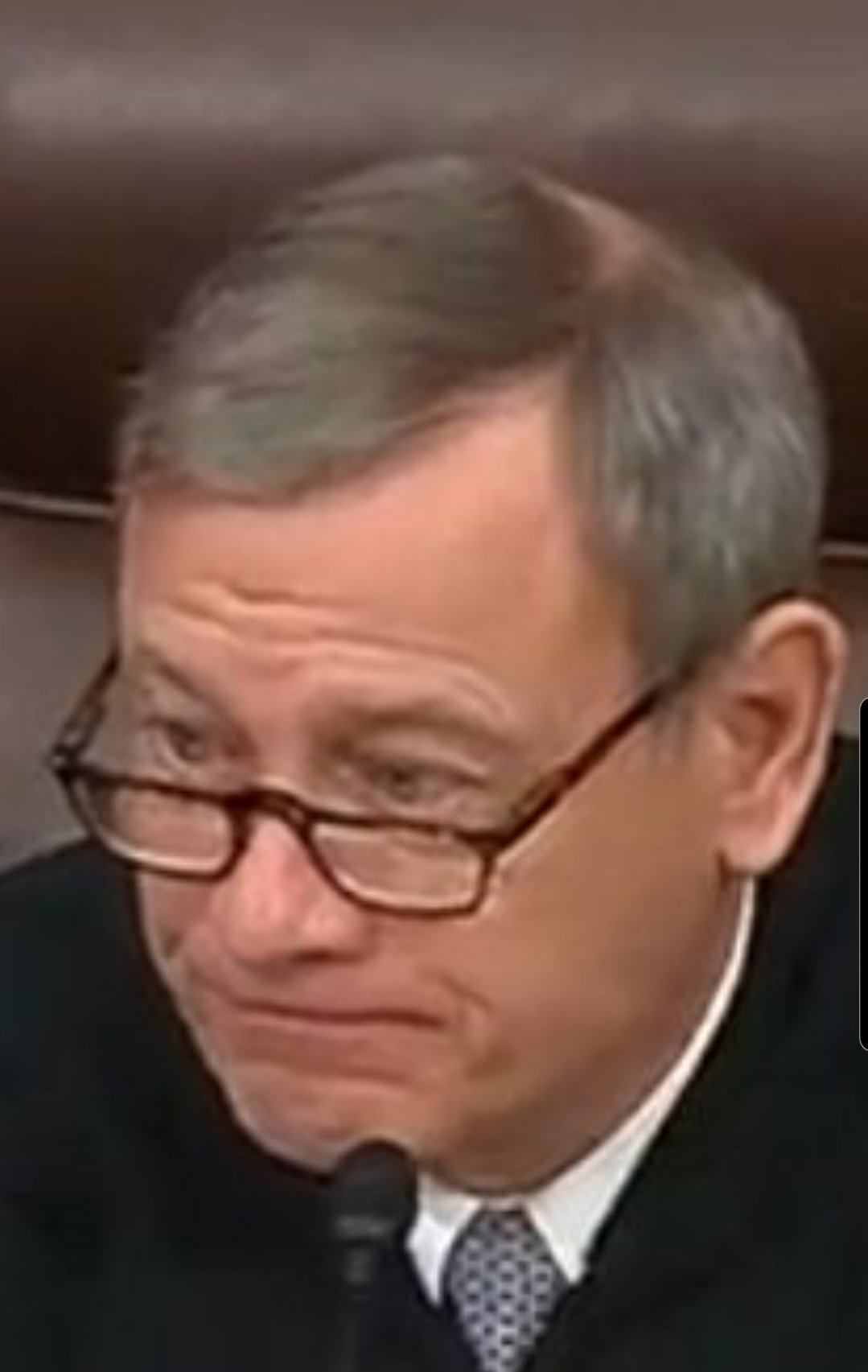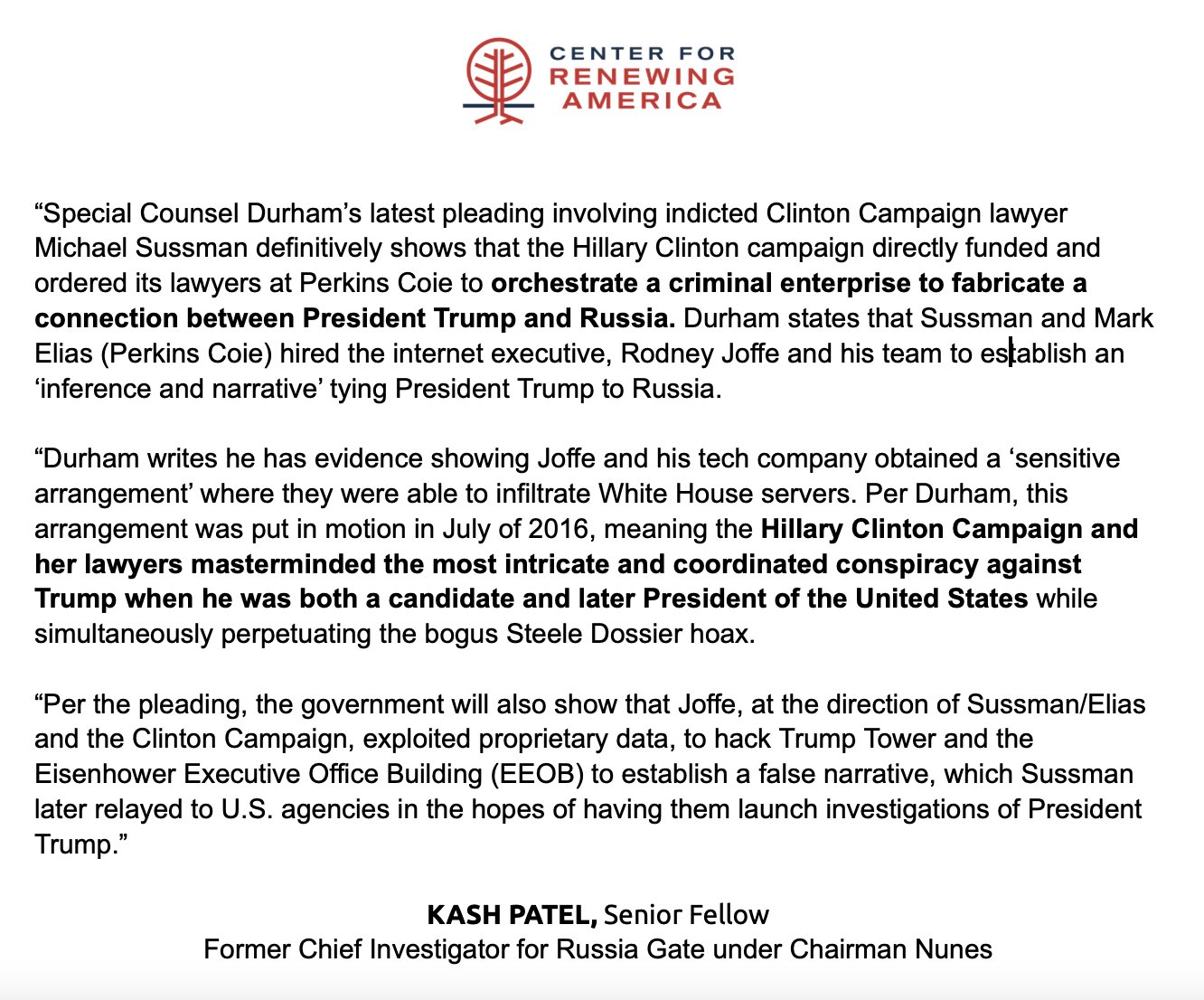This paragraph, describing the role that aspiring FBI Director Kash Patel played in Trump’s video collaboration with a bunch of mostly-violent Jan6ers, appears about two thirds of the way through a very good NYT review of how Trump has rewritten the history of January 6.
Mr. Trump recorded his contribution at his Mar-a-Lago residence in Florida, while the choir was recorded with a phone in the Washington jail. The song — a fund-raising effort that the Trump loyalist Kash Patel, now the president-elect’s nominee to head the F.B.I., helped produce — concludes with a defiant echo of the “U.S.A.!” chants that resounded during the Jan. 6 attack.
Kash Patel has been central to the success of Trump’s repackaging of his own crimes as grievance from the start.
And I’ve been trying to figure out how that’ll work as I contemplate what I think of as Trump’s Conspiracy Cabinet.
I’ve been thinking of his nominations as a combination of a highly competent Christian nationalist core (led by Stephen Miller and Russ Vought), largely filled out with people who’ll be in the business of graft and other kinds of corruption — whether for their own benefit or Trump’s. But the most unpredictable element is how Trump plans to fill government with embodiments of the conspiracies that have become central to his movement.
That’s most evident in virtually of Trump’s health-related appointments, starting with Bobby Kennedy (who might yet lose his confirmation battle). I don’t, for a second, believe the claim from someone adjacent to Roger Stone that Trump picked RFK and Tulsi Gabbard as a way to tap into a realignment of Democrats. Rather, Trump had to appoint them to keep the likes of Matthew Livelsberger , who invoked RFK in his manifesto, engaged, no matter the cost. And so after having presided over a heroic rush to develop a COVID vaccine in his first term, Trump will hand over America’s scientific crown jewels to people who don’t believe in science.
What will happen when these conspiracists confront the immutable laws of science? What will happen when gravity hits?
And how many children will die as a result?
The damage that Tulsi will be able to do (again, her confirmation is not assured) at National Intelligence is more measurable. US intelligence has been politicized for years. Forever. Such politicization as often as not cause self-perpetuating scandal cycles. And if not, Bad Things will likely result that will harm the US and lead to avoidable catastrophes that Trump should own.
It’s the damage posed by Kash’s likely installation at FBI — he has a better shot at confirmation than either RFK or Tulsi — that I can’t fully grok.
Back in the halcyon days of the Durham investigation, I came to believe that gravity would defeat these grievance myths, would defeat the kinds of conspiracies Kash sows, too. Even with Durham, Kash helped facilitate the false claims Durham spun out of theories of conspiracy hung on two false statements indictments. A key prong of the Sussmann prosecution — into what he said to the CIA in January 2017 — arose out of a question Kash somehow knew to ask on December 18, 2017. Then, after Durham deliberately misrepresented legitimate intelligence that Georgia Tech discovered dating to the Obama Administration to insinuate that Trump had been spied on, Kash made a number of unhinged claims to expand on Durham’s already false claim.
But the oddest statement came from “Former Chief Investigator for Russia Gate [sic]” and current key witness to an attempted coup, Kash Patel, sent out by the fake Think Tank that hosts some of the former Trumpsters most instrumental in covering up for Trump corruption.
Taken literally (which one should not do because it is riddled with false claims), the statement is a confession by Kash that he knew of what others are calling “spying” on Trump and did nothing to protect the President.
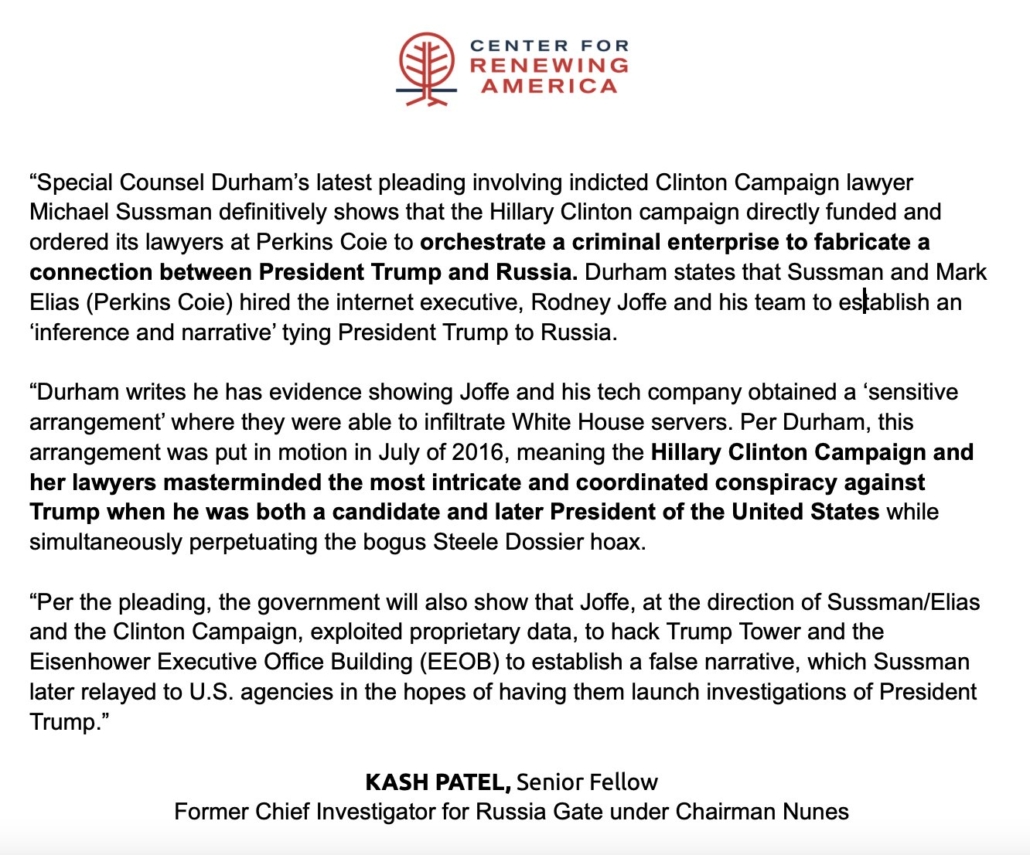
Let’s start, though, by cataloguing the false claims made by a man who played a key role in US national security for the entirety of the Trump Administration.
First, he claims that the Hillary Campaign, “ordered … lawyers at Perkins Coie to orchestrate a criminal enterprise to fabricate a connection between President Trump and Russia.” Thus far, Durham has made no claims about any orders coming from the Hillary Campaign (and the claim that there were such orders conflicts with testimony that Kash himself elicited as a Congressional staffer). The filing in question even suggests Perkins Coie may be upset about what Sussmann is alleged to have done.
Latham – through its prior representation of Law Firm-1 – likely possesses confidential knowledge about Law Firm-1’s role in, and views concerning, the defendant’s past activities.
In fact, in one of the first of a series of embarrassing confessions in this prosecution, Durham had to admit that Sussmann wasn’t coordinating directly with the Campaign, as alleged in the indictment.
Kash then claims that “Durham states that Sussmann and Marc Elias (Perkins Coie) … hired .. Rodney Joffe … to establish an ‘inference and narrative’ tying President Trump to Russia.” That’s false. The indictment says the opposite: Joffe was paying Perkins Coie, not the other way around. Indeed, Durham emphasized that Joffe’s company was paying Perkins Coie a lot of money. And in fact, Durham shows that the information-sharing also went the other way. Joffe put it together and brought it to Perkins Coie. Joffe paid Perkins Coie and Joffe brought this information to them.
Kash then claims that “Durham writes that he has evidence showing Joffe and his company were able to infiltrate White House servers.” Kash accuses the Hillary Campaign of “mastermind[ing] the most intricate and coordinated conspiracy against Trump when he was both a candidate and later President.” This betrays either real deceit, or ignorance about the most basic building blocks of the Internet, because nowhere does Durham claim that Joffe “infiltrated” any servers. Durham, who himself made some embarrassing technical errors in his filing, emphasizes that this is about DNS traffic. And while he does reveal that Joffe “maintain[ed] servers for the EOP,” that’s not infiltrating. These claims amount to a former AUSA (albeit one famously berated by a judge for his “ineptitude” and “spying”) accusing a conspiracy where none has been charged, at least not yet. Plus, if Joffe did what Kash claims starting in July 2016, as Kash claims, then Barack Obama would be the one with a complaint, not Trump.
Finally, Kash outright claims as fact that Joffe “exploited proprietary data, to hack Trump Tower and the Eisenhower Executive Office Building.” This claim is not substantiated by anything Durham has said and smacks of the same kind of conspiracy theorizing Louise Mensch once engaged in. Only, in this case, Kash is accusing someone who has not been charged with any crime — indeed, a five year statute of limitation on this stuff would have expired this week — of committing a crime. Again: a former AUSA, however inept, should know the legal risk of doing that.
Curiously, Kash specifies that the White House addresses involved were in the Eisenhower Executive Office Building. That could well be true, but Durham only claims they were associated with EOP, and as someone who worked there, Kash should know that one is a physical structure and the other is a bureaucratic designation. But to the extent Kash (who has flubbed basic Internet details already) believes this amounted to hacking the EOP, it is based off non-public data.
So, like I said, the piece is riddled with false claims, but with two claims that go beyond anything Durham has said.
This one-two punch — first Durham misrepresenting evidentiary claims and then Kash spinning Durham’s misrepresentations free of all mooring — resulted in Trump making death threats targeting Sussmann and an entire campaign targeting Rodney Joffe.
But in the end, even though Durham’s lawyers repeatedly defied Judge Christopher Cooper’s orders, they ultimately mostly failed to present the theory of conspiracy they had about Sussmann’s alleged false statement. Sussmann, after paying superb lawyers a bunch of money, having his career disrupted, and facing death threats ginned up by the former President, was acquitted.
The process worked, but not before a great many people’s lives were upended, irrevocably.
So even though only NYT joined me, in exposing the degree to which a theory of conspiracy, and not any real evidence, lay behind Durham’s insinuations of guilt, even though the legacy media chased Durham’s theory of conspiracy hook line and sinker, I at least believed that the system would work.
The Hunter Biden prosecution has disabused me of that faith. Between the fact that Hunter really did evade taxes — the presence of a crime that could substitute for all the unsubstantiated claims about him — and the way a multi-year revenge porn campaign solidified the legacy media belief he was too icky for due process, prosecutors continue to make outlandish claims with little pushback, much less curiosity about why a witness to a crime is overseeing the investigation into it.
As FBI Director Kash will have the ability to do what he did in advance of the Sussmann hearing, find some nugget, tangential to any topic at hand, on which to hand a larger conspiracy theory.
Amid all the focus on Trump naming his defense team to run DOJ, there has been little focus on the fact that Emil Bove, whom he named to PADAG (even though the position doesn’t require confirmation and once confirmed as DAG, Todd Blanche could presumably put anyone he wants in the position), presided over a serious discovery violation scandal at SDNY, which forced him out of DOJ. If judges continue to hold DOJ to already weak discovery requirements, due process might survive. But if DOJ institutionally permits prosecutors to ignore their ethical guidelines, it will become far, far easier to frame defendants.
And the press has simply stopped reporting on due process, choosing instead to chase whatever dick pics propagandists unpack in front of them.
Kash Patel earned his nomination to be FBI Director by being the self-described wizard of Trump’s grievance myth. He has done such a tremendous job spinning that myth that even some good faith Republican Senators believe that myth as true.
And while I’m sure that gravity will eventually catch up to RFK Jr, as it did in Samoa, while I have every expectation to continue doing what I do, if only to witness further assaults on due process, I’m far less sanguine about gravity’s effect on a Kash-run Bureau.

